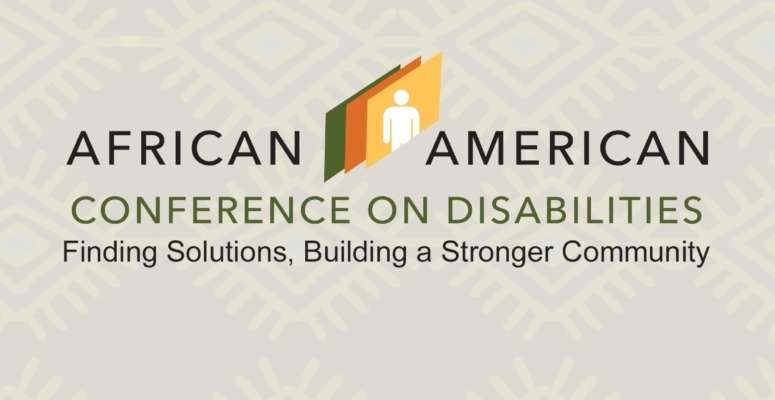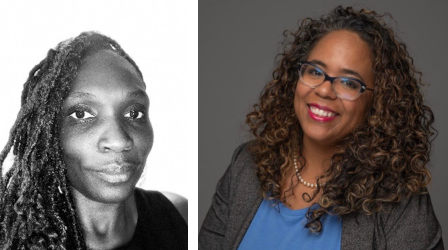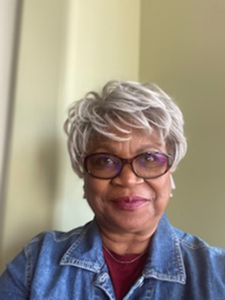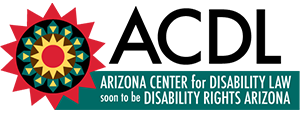2024 African American Conference on Disabilities:
June 28 at the Hyatt Regency in Downtown Phoenix
CLICK HERE TO REGISTER NOW!
If you would like to be a sponsor, vendor, or exhibitor for the 2024 conference, please email Renaldo Fowler, rfowler@disabilityrightsaz.org.
The Disability Rights Arizona proudly announces the 2024 African American Conference on Disabilities.
The conference will be on June 28, at the Hyatt Regency in downtown Phoenix.
The AACD is the premier comprehensive disability conference in the United States that addresses the intersection between race and disability. The conference examines avenues for self-advocacy to ensure the effective provision of services, resources, and enforcement of civil rights in the African American and disability communities.
In the past several years, over 15,000 virtual attendees have come from all across Arizona, almost every state in the U.S., U.S. Virgin Islands, Canada, Africa, and Europe to learn and ask questions on a wide range of disability issues.
We need your financial support and sponsorship for our Conference. Your sponsorship will make a difference to help defray the costs to attend the conference for individuals or families in financial need, so they can obtain information and gain access to resources for themselves or their family members with disabilities.
The virtual 2024 conference will be available in April but please see the sessions from our 2023 virtual conference below:
Scroll down to review the videos from the 2023 virtual preview conference.

Session #1 February 8, 2023 9:00am-10:30am
Crossroads: The Intersectional Approach to Disability Justice framework
Our acceptance and inheritance of the disability identity depend on our ability to empower and amplify the voices and experiences of Black disabled persons. This presentation will be an introduction of the disability justice framework through an intersectional lens. In sharing my lived experiences as a black disabled woman my goal is to illustrate how intersectionality should be the core of all disability justice narratives.

Presenter:
Rasheera Dopson, MPH
Rasheera Dopson, MPH is a disability justice advocate, author, scholar, speaker, content creator, and researcher. Her research centers around advancing health equity within marginalized communities through implementing and applying equity-based research in communities and policy frameworks. She is the founder of the Dopson Foundation and Beauty with a Twist brand—whose organizational aim is the advancement and betterment of professional, health, and social outcomes for women and girls with disabilities.
Watch Presentation:
Links for Session #1:
Session #2 February 8, 2023 1:00pm-2:30am
Sankofa: Expanding A Black Family Support Group into the Midwest
Sankofa is a social network that was founded in California in 2015 in order to meet the unique needs of parents of Black children with autism and other developmental disabilities. In 2022, family leaders in Wisconsin and Michigan began a pilot to expand the Sankofa social network to the Midwest.
In this session, two leaders of Sankofa Midwest describe the process of launching Sankofa in their region, and why it felt like an important project. You will walk away understanding the challenges faced as a parent and child with a disability in the black community, how we can support families, and how we can support each other.

Presenters:
- Ida Winters
Ida Winters is the mother of 3 wonderful young men who all live with special healthcare needs and one who received a late diagnosis of Autism. Ida strongly believes that the only way for change to truly happen is by educating and empowering the underserved, underprivileged, underrepresented, as well as the overlooked populations, and changing the narrative from “underserved to well served”!
Ida currently works at the University of Wisconsin – Madison, Waisman Center as an Outreach Associate and Family Engagement Specialist. Ida also works with the Wisconsin Leadership Education in Neurodevelopmental and Related Disabilities (WI LEND) program as a Family Peer Mentor. Ida is a 2020-2021 LEND graduate and was named the Associations of University Centers on Disabilities’ WI Emerging Leader.
- Elizabeth Holliday Morgan, Ph.D., Assistant Professor in the Doctorate of Educational Leadership program, California State University Sacramento
Elizabeth Holliday Morgan, Ph.D. is an Assistant Professor in the Doctorate of Educational Leadership program at California State University Sacramento (CSUS). An educator by training, she holds a Master’s in Education from the Harvard Graduate School of Education and has supported Early Childhood practitioners in utilizing developmentally appropriate practice and inclusion strategies since 2004. Her area of research focus includes Early Childhood and Early Intervention Services with a specific interest in under-represented populations.
She has co-authored publications titled “Narratives of single, Black mothers using cultural capital to access autism interventions in schools” in the British Journal of Sociology of Education and “Caregiver Voices: Cross-Cultural Input on Improving Access to Autism Services” published in the Journal of Racial and Ethnic Health Disparities and has several additional publications under review. Before arriving at CSUS Elizabeth worked as a researcher at the UC Davis MIND Institute. When she isn’t thinking about autism service equity, Elizabeth enjoys the theater and spending time with her family and their dog, Billie Jean.
Watch Presentation:
Session #2 Links:
Session #3 February 9, 2023 9:00am-10:30am
Meeting the Educational Needs of Arizona’s Foster Youth – A Panel Discussion
African-American children are disproportionately represented in foster care systems across the country, as are students with disabilities. This panel session will discuss the educational challenges faced by children in foster care, as well as the laws that exist to protect them and the steps key players in Arizona are taking to improve educational outcomes for foster youth. The panel will include a representative from the Arizona Department of Child Safety, the Arizona Department of Education, nonprofit education advocacy group FosterEd Arizona, a former foster parent, and a special education attorney from the Arizona Center for Disability Law.

Presenters:
- Czarina Valadez, South Region Program Specialist, Arizona Department of Child Safety
Czarina Valadez is employed by Arizona Department of Child Safety (DCS), as the South Region Program Specialist. She has a Bachelor’s Degree in Family Studies and Human Development from University of Arizona and a Master’s Degree in Social Work from Arizona State University. One of her many roles is child welfare liaison for Every Student Succeeds Act (ESSA) for Cochise, Pima, Santa Cruz, and Yuma counties. She helps DCS staff work with local schools, advocating that foster youth remain in their school of origin when there has been a change in their living arrangement and when it is in their best interest. Czarina’s passion is ensuring foster youth are afforded the same opportunities as youth not in the child welfare system.
- Joey Taylor, Foster Care Education Coordinator, Arizona Department of Education
Hailing from the hills of South Phoenix, Joey Taylor was formed, raised, and educated in Arizona. Joey has a diverse background that spans the halls of jail, the desks of exceptional students, and the homes of families in crisis. Currently serving as the Foster Care Education Coordinator for the Arizona Department of Education, Joey oversees every public school & charter to ensure the successful implementation of the educational rights of students in foster care. Joey strives tirelessly to support educators, child welfare workers, and caregivers to impact children in foster care and promote their bright educational future.
- Ashely Dickerson, Maricopa County Senior Program Manager, FosterEd: Arizona
Ashely is the Maricopa County Senior Program Manager with FosterEd: Arizona, and a former FosterEd Arizona Education Liaison. She is a proud Arizona native and attended the University of Arizona where she studied the Social and Cultural Foundations in Public Education while focusing on Adolescent Development, Ed Policy and Africana Studies. Ashely has extensive experience both in and out of the traditional education field and has worked with various nonprofits including serving as an elementary school teacher, completing four terms as an AmeriCorps member in her community, and launching her own leadership and empowerment program for girls of color. Education campaigns and civic engagement are at the core of her efforts. She is passionate about creating an equitable and just education system in Arizona, which has led her to FosterEd: Arizona.
- Jennie Hedges, foster/adoptive parent
Jennie Hedges (she/her) (pictured second from the right), originally from New Jersey, is a wife and mother of three living in Tucson, AZ. Jennie and her wife were kinship and foster parents for several years before closing their license following their daughter’s adoption in 2021. Jennie is also a Senior Program Manager with FosterEd Arizona and has worked within FosterEd since 2017. As a mother to three children who all have unique needs, Jennie joins our panel ready to talk about her family’s experiences navigating and supporting one another through the child welfare system, special education, and more.
- Amanda Glass, Education Team Managing Attorney, Arizona Center for Disability Law
Amanda Glass is the Education Team Managing Attorney at the Arizona Center for Disability Law (ACDL). Amanda began her legal career at ACDL as an Equal Justice Works Fellow with a fellowship project focused on improving access to special education and mental health services for children affected by Arizona’s foster care system. Amanda has continued that work over the last four years in her subsequent roles at ACDL as staff attorney and managing attorney. Amanda is a graduate of Arizona State University’s Sandra Day O’Connor College of Law. Prior to attending law school, Amanda earned her master’s degree in special education and spent two years as an elementary school special education teacher in Los Angeles through Teach for America.
Watch Presentation:
Session #3 Links:
Session #4 February 9, 2023 1:00pm-2:30pm
Tracing the Trauma Thread from our Ancestors to Present Healing
Relationships can cause trauma and at the same time relationships can heal trauma. How we engage with the world is developed by the relationships we experience starting before birth. How has the unconscionable and inhumane act of slavery in US history impact the bodies and brain development of enslaved Africans and their descendants across generations? Let’s talk about how trauma moved through their bodies, homes and communities, and left its mark on their children. How can we heal from historical trauma and achieve wellness?

Presenter:
- Carlian W. Dawson, Ed.D.
Carlian W. Dawson, Ed.D. has more than 40 years broad-based experience as a teacher, principal (retired), associate professor, director of diversity for a major land grant university and a non-profit director. She develops and facilitates training for educators and business professionals at every level.
Dr. Dawson has invaluable experience as one of the developers and Master Trainer-of-Trainers for Adverse Childhood Experiences (ACEs) for the AZ ACEs Consortium and the Neurosequential Model for Caregivers (NMC) with the Arizona Council of Human Service Providers.
A graduate from Grand Canyon University, Dr. Dawson also has two Masters’ Degrees from Arizona State University in Multicultural Education and School Administration and, a Doctorate in Educational Leadership from Illinois State University. She’s been married for 37 years to Roy and they have 7 children, and 9 grandchildren.
Watch Presentation:
